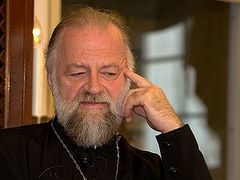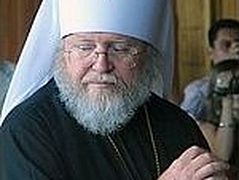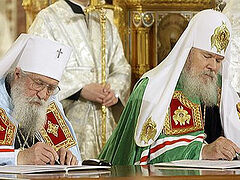 The Assembly of Canonical Orthodox Bishops in 2010. Photo: Orthodox Wiki.
The Assembly of Canonical Orthodox Bishops in 2010. Photo: Orthodox Wiki.
Fr. John Whiteford discusses a question that often arises: "Since the Russian Orthodox Church Outside of Russia (ROCOR), and the Moscow Patriarchate (MP) have reconciled, why is it that we still have three jurisdictions of Russian origin in the US? We still have ROCOR, we have parishes that are still part of the MP, and we have the Orthodox Church in America (OCA) which was granted a Tomos of Autocephaly by the MP. Aside from all of the historical past disagreements and associated negative “reasons" for why these jurisdictions came into being, is anything being done to unite these three jurisdictions?"
To understand why these three jurisdictions are not already united into one jurisdiction, you do need to understand the history of why we ended up with three Russian jurisdictions in the first place. Prior to the Bolshevik Revolution, there was only one united jurisdiction in North America. The Bolshevik Revolution put militant atheists in a position to cause divisions in the Church, and they did not fail to take advantage of that power.
Foreseeing the difficulties the Russian Church would be facing under a militant atheist regime, Patriarch Tikhon did two things to enable the Church to continue to function. He issued Ukaz 362, which allowed for bishops separated from communication with the Mother Church to form their own temporary ecclesiastical authorities to govern the Church. He also appointed three locum tenentes (temporary administrators, pending the election of a new Patriarch) who were to take his place, because he feared that the Church might not be able to appoint a locum tenens when the time came, and he appointed three so that if the first one was not able to take office, the second one would, and if he was unable, the third one would. To make a long story short, the Soviets imprisoned all of the locum tenentes, and we ended up with a deputy locum tenens in charge, Metropolitan Sergius. So we had an unprecedented situation, with two other unprecedented solutions piled on top.
The acting head of the Russian Church, Metropolitan Sergius, was forced by the Soviets to issue a declaration of loyalty to the Soviet Union, which even clergy outside of Russia were expected to consent to. Most of those clergy did not go along with this, however. At first the bishops outside of Russia were all united under the auspices of the Russian Orthodox Church Outside of Russia, but disagreements about how to proceed, and how those outside of Russia should be related to the Church inside of Russia, under Metropolitan Sergius, led to divisions. There is a fairly well done, but brief, history of the relationship between ROCOR and what became the OCA (originally known as the American Metropolia) here: https://orthodoxwiki.org/ROCOR_and_OCA But to sum it up, there were two periods of time when ROCOR and the American Metropolia were united: first 1921-1926, and then again from 1935-1946. In the late 60's, they almost united united a third time, but the Moscow Patriarchate offered the American Metropolia a Tomos of Autocephaly, which brought those discussions to an end.
During these years, there were also a number of parishes in North America that came under the authority of the Moscow Patriarchate directly, and were neither ROCOR nor OCA, though the number was always the smaller of the three by far.
One important thing to understand about the Tomos of Autocephaly given to the OCA is that it specifically stated that this Tomos did not invalidate any other Orthodox jurisdiction (such as the Antiochian and Greek Archdioceses) in North America, and provided for the continued separate existence of Moscow Patriarchal parishes that did not want to be part of the OCA. And so this Tomos is clearly not a Tomos of Autocephaly in the usual sense, because normally, an Autocephalous Church has exclusive jurisdiction over their own territory, by definition. And so in reality, what this Tomos did was it allowed the OCA and the MP to reconcile, without the OCA having to submit to the MP at a time when the MP was still under severe persecution by the Soviets, and as such, were subject to manipulation by the Soviets (which is why the OCA did not reconcile sooner, when that would have meant becoming a part of the MP). You could also say that the Tomos had the hope that eventually all the other jurisdictions in North America would come together, and make the OCA a truly united and autocephalous Church in the usual sense of the term.
So when ROCOR and the MP reconciled in 2007, it certainly was a topic of some discussion about whether the three Russian jurisdictions in North America would unite, but I think most people understood that this was not possible at the time. The practical pastoral issue is that for many decades, the relationships between these jurisdictions have often been strained. You also had clergy and whole parishes that went from one jurisdiction to the other, and not always because of reasons of principle, but simply because of problems with particular bishops. We are now able to have cordial relations with each other, and there has been a growing level of cooperation between the jurisdictions, but there are issues that remain.
There were some hopes that the Assembly of Bishops might not only bring these three jurisdictions together, but all the others in North America as well, but any such hopes of that happening in the foreseeable future have been dashed by the Ecumenical Patriarchate's recognition of the schismatics in Ukraine. So it is more likely that there would be some merger of these three jurisdictions before there would be anything on the larger scale, but even this has obstacles.
I think it is likely that down the road there will be a unification of MP parishes in Western Europe with ROCOR. I could see there being a Metropolitan of Australia and New Zealand, and that becoming its own entity. And it is certainly possible that some merger could happen in North America, but while there are parts of the OCA that are very close to ROCOR in terms of their ethos, there are also elements that have embraced a modernist spirit that is quite foreign to us, and so I think the OCA would need to deal with that before any serious talk of a merger in North America would be possible. The OCA does have many positive things going for it, and many things it does well, and ROCOR is certainly not without its own problems. We don't know what the future holds. Future developments may help bring us all together. There is much upheaval in society today, as well as in the Church, and we can pray that as God shakes things up around us, that He will lead us all closer to Him, which would inevitably bring us all together.




